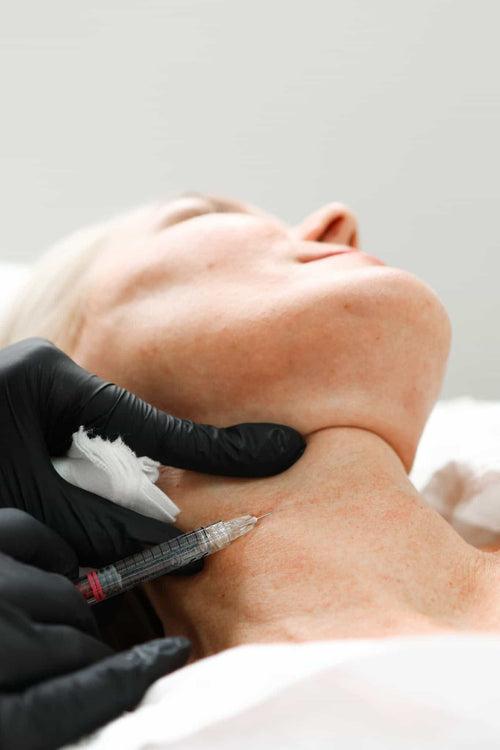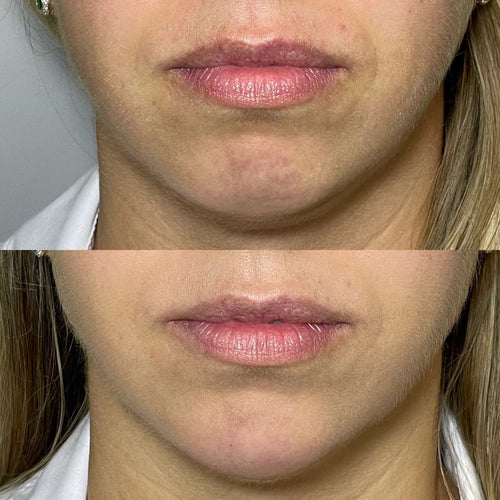Book Your Dermal Filler Appointment with Dr. Laura Geige Today
Immediate Post-Treatment

First 24 Hours
Immediately following chin filler treatment, it’s important to follow these guidelines for the first 24 hours to ensure proper healing and optimal results.
-
Avoid strenuous activity:
-
Stay upright:
-
Ice packs:
-
Hydrate well:
Refrain from exercising, heavy lifting, or any activity that may increase blood flow to the treated area. This can lead to swelling and bruising.
Sleep with your head elevated to minimize swelling. Consider using extra pillows to keep your chin slightly raised throughout the night.
Apply ice packs wrapped in a towel to the treated area for 15-20 minutes at a time, several times a day. This will help reduce inflammation and discomfort.
Drink plenty of water to flush toxins and promote healing. Avoid alcohol and caffeine as they can dehydrate you and worsen swelling.

Regarding food, it’s best to stick to soft foods that are easy to swallow and digest for the first 24 hours after treatment.
Examples include:
-
Broths and soups
-
Smoothies
-
Mashed potatoes or sweet potatoes
-
Avocados
-
Yogurt
Avoid crunchy, chewy, or spicy foods as they can irritate the treated area.
Remember, it’s always best to consult with your provider for specific post-treatment instructions tailored to your individual needs.
Foods to Avoid
Immediate post-treatment care is crucial for optimal results and minimizing potential complications after chin filler injections.
It’s generally recommended to avoid strenuous activity, bending over, or lying down flat for at least **24 hours** following the procedure. This helps prevent migration of the filler material.
You can usually resume light activity and normal daily routines within a few hours. However, it’s best to listen to your body and avoid anything that causes discomfort or swelling.
While there are no strict dietary restrictions immediately after chin fillers, certain foods should be avoided to minimize the risk of bruising, swelling, and inflammation:
• Alcohol:** Alcohol can thin the blood, increasing the likelihood of bruising and prolonging healing time. It’s best to abstain from alcohol for at least 24 hours.
• Spicy Foods:** Spicy foods can irritate the treated area and potentially worsen inflammation or swelling.
• Salty Foods: Sodium can cause fluid retention, which may contribute to puffiness. Limit your salt intake in the days following your treatment.
• Caffeine:** Similar to alcohol, caffeine can be a blood thinner, potentially increasing bruising.
Book a Consultation for Dermal Fillers with Dr. Laura Geige at It’s Me and You Clinic
Drinking plenty of water is essential for staying hydrated and promoting healing.
Foods You Can Have
After receiving chin filler injections, it’s important to allow time for swelling to subside before consuming food and drinks.
Generally, you can start with **soft foods** within a few hours of your treatment. Avoid anything spicy, acidic, or crunchy that might irritate the injection sites.
Here are some suitable options:
-
Yogurt
-
Smoothies
-
Soup
-
Scrambled eggs
-
Applesauce
-
Mashed potatoes
Gradually introduce firmer foods as you feel comfortable over the next few days. Listen to your body and avoid anything that causes discomfort or pain.
It’s also crucial to stay hydrated by drinking plenty of water. This will help flush out any excess fluids and promote healing.
Remember, everyone heals differently, so it’s best to follow your injector’s specific post-treatment instructions.
The First Few Days
Swelling and Recovery Timeline
Immediately following chin filler injections, it’s recommended to avoid eating for at least a few hours. This allows time for any potential bruising or swelling to subside and prevents the filler from moving around too much.
During the first few days after treatment, expect some mild swelling, redness, and tenderness in the chin area. This is a normal part of the healing process as your body adjusts to the new volume.
Within a day or two, the swelling should begin to decrease. You can usually resume a normal diet at this point, avoiding very hot or cold foods and drinks that could irritate the injection site.
Complete recovery from chin filler typically takes about a week, though it may take up to two weeks for all swelling to disappear completely.
During the initial recovery period, it’s important to follow your injector’s post-treatment instructions carefully. This may include avoiding strenuous activity, wearing compression garments if recommended, and using ice packs to reduce swelling.
Eating Tips for Minimizing Discomfort
Immediately following a chin filler procedure, it’s recommended to avoid strenuous activity and any activities that may increase blood flow to the treated area.
The swelling and bruising associated with chin fillers typically peak within 24-48 hours, gradually subsiding over the next few days.
While there are no strict dietary restrictions after chin filler injections, certain foods can potentially exacerbate swelling or discomfort. It’s best to stick to a soft food diet during the initial days post-procedure.
-
Hydration is key: Drink plenty of water to stay hydrated and help flush out toxins.
-
Avoid Alcohol:**
Alcohol can dehydrate you, potentially worsening swelling.
-
Limit Salt Intake:**
Sodium can contribute to fluid retention, increasing puffiness.
-
Opt for Cold Foods and Smoothies:
Cold foods tend to have a soothing effect on inflammation. Blended smoothies are an excellent way to get nutrients without chewing.
Here are some specific food suggestions for minimizing discomfort:
-
Broths and Soups:**
Easy to digest and provide hydration.
-
Applesauce and Yogurt:
-
Mashed Bananas or Potatoes:
Soft and gentle on the jawline.
-
Cooked Vegetables (Pureed or Mashed):
Gradually reintroduce other foods as you feel comfortable. If any food triggers swelling or discomfort, avoid it. Listen to your body and prioritize nourishing meals that support healing.
Long-Term Dietary Considerations
Potential Allergic Reactions
Following a chin filler procedure, it’s crucial to prioritize proper nutrition and be mindful of potential allergic reactions.
While you can resume your regular diet relatively quickly, some **foods** may be best avoided immediately post-treatment. Foods that are highly acidic or spicy can irritate the injection sites, potentially causing discomfort or swelling.
It’s recommended to stick with bland foods for the first few days after your procedure.
Examples of safe options include:
-
Plain yogurt
-
Smoothies
-
Mashed potatoes
-
Broth-based soups
Gradually reintroduce other foods into your diet as tolerated, paying attention to how your body responds.
**Allergic Reactions**:
Though rare, allergic reactions to filler materials can occur. Be vigilant for any signs of an adverse reaction, including:
-
Swelling that extends beyond the injection site
-
Redness or rash
-
Itching
-
Difficulty breathing
Consult Dr. Laura Geige for Dermal Fillers at It’s Me and You Clinic
If you experience any of these symptoms, seek immediate medical attention.
**Hydration**:
Drinking plenty of water is essential for healing and reducing the risk of swelling. It also helps to flush out toxins from your body.
Impact of Certain Foods on Filler Longevity
Following a chin filler procedure, it’s essential to prioritize proper nutrition for optimal healing and to potentially maximize the longevity of your results. While there’s no definitive timeframe on when you can fully resume a normal diet, certain dietary considerations during the initial recovery period can be beneficial.
In the immediate aftermath of the procedure, sticking to soft foods that are easy to swallow is crucial. This minimizes any strain on the treated area and reduces the risk of irritation or displacement of the filler.
As you progress through your healing journey, incorporating foods rich in collagen, antioxidants, and essential nutrients can contribute to overall skin health and potentially support the longevity of your chin filler.
Here’s a breakdown of certain food categories and their potential impact on filler longevity:
Foods that may help support filler longevity:
- Collagen-Rich Foods: Collagen is a protein that provides structure to skin, contributing to its elasticity and firmness. Consuming foods rich in collagen or precursors like glycine and proline can potentially promote healthy skin tissue.
- Antioxidant-Packed Foods: Antioxidants combat free radicals, which can damage skin cells and contribute to premature aging. Berries, dark leafy greens, citrus fruits, nuts, and seeds are excellent sources of antioxidants.
- Vitamin C-Rich Foods: Vitamin C is essential for collagen production. Incorporating foods like bell peppers, strawberries, broccoli, and kiwi can support collagen synthesis and skin health.
- Omega-3 Fatty Acids: Omega-3 fatty acids have anti-inflammatory properties that may benefit skin health and potentially reduce the breakdown of filler over time. Fatty fish (salmon, tuna, mackerel), flaxseeds, chia seeds, and walnuts are good sources of omega-3s.
Foods to Limit or Avoid:
- Processed Foods: Highly processed foods often contain additives, sugars, and unhealthy fats that can negatively impact skin health.
- Alcohol: Alcohol can dehydrate the body and potentially interfere with healing processes.
- Excessive Sugar: High sugar intake can contribute to inflammation and collagen breakdown.
**Remember:** While diet can play a role, filler longevity is primarily influenced by factors such as the type of filler used, individual skin characteristics, sun exposure, and lifestyle habits.
It’s always best to consult with your qualified injector or healthcare provider for personalized dietary advice tailored to your specific needs and circumstances.
BeyBey Name The New Cinema Magazine The First Come First Served
- Can Bum Filler Injections Be Done In One Session? - May 1, 2025
- Botox Nasal Flare Treatment In Covent Garden, London - May 1, 2025
- How Long Temple Filler Last - April 30, 2025
